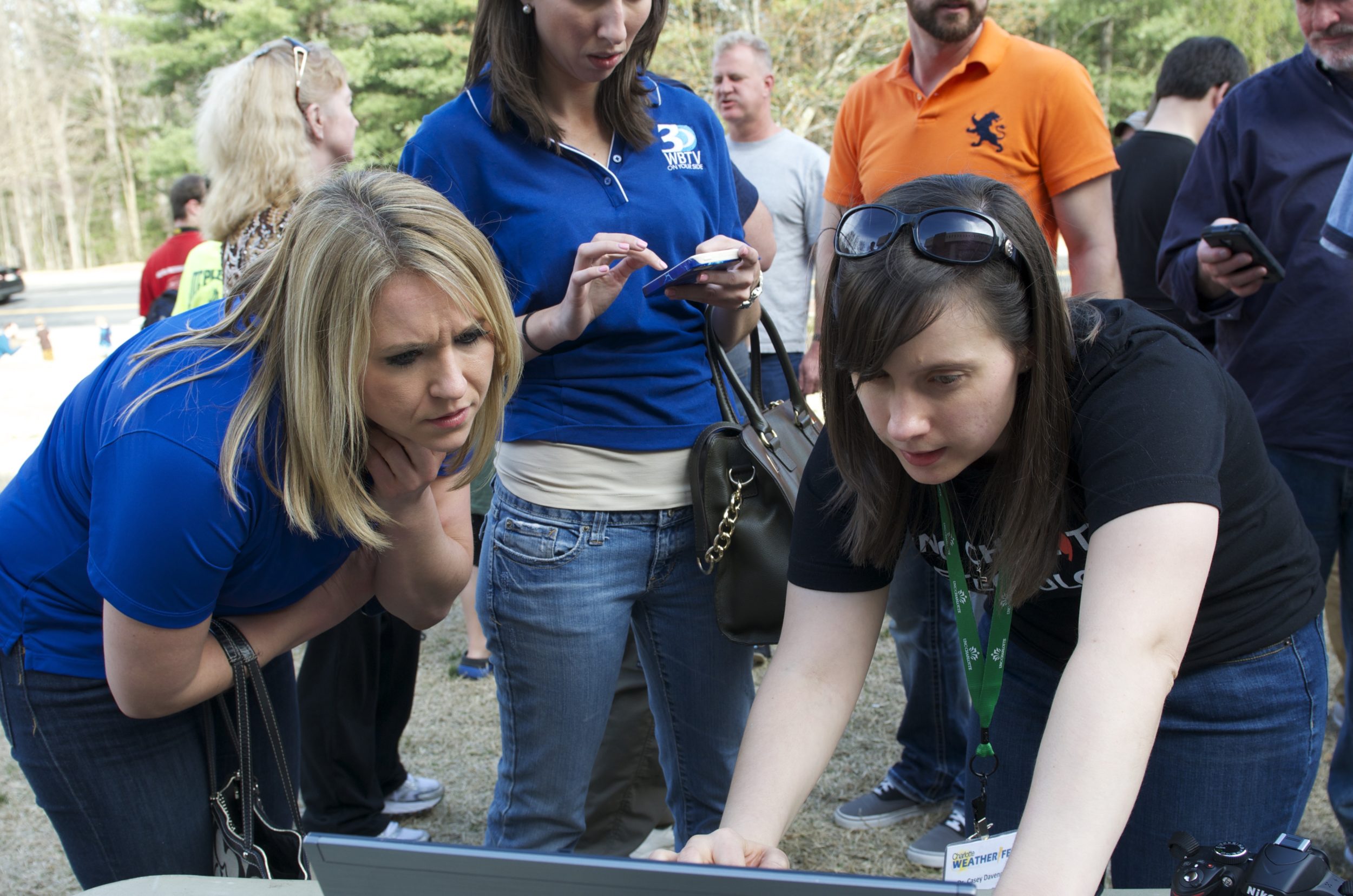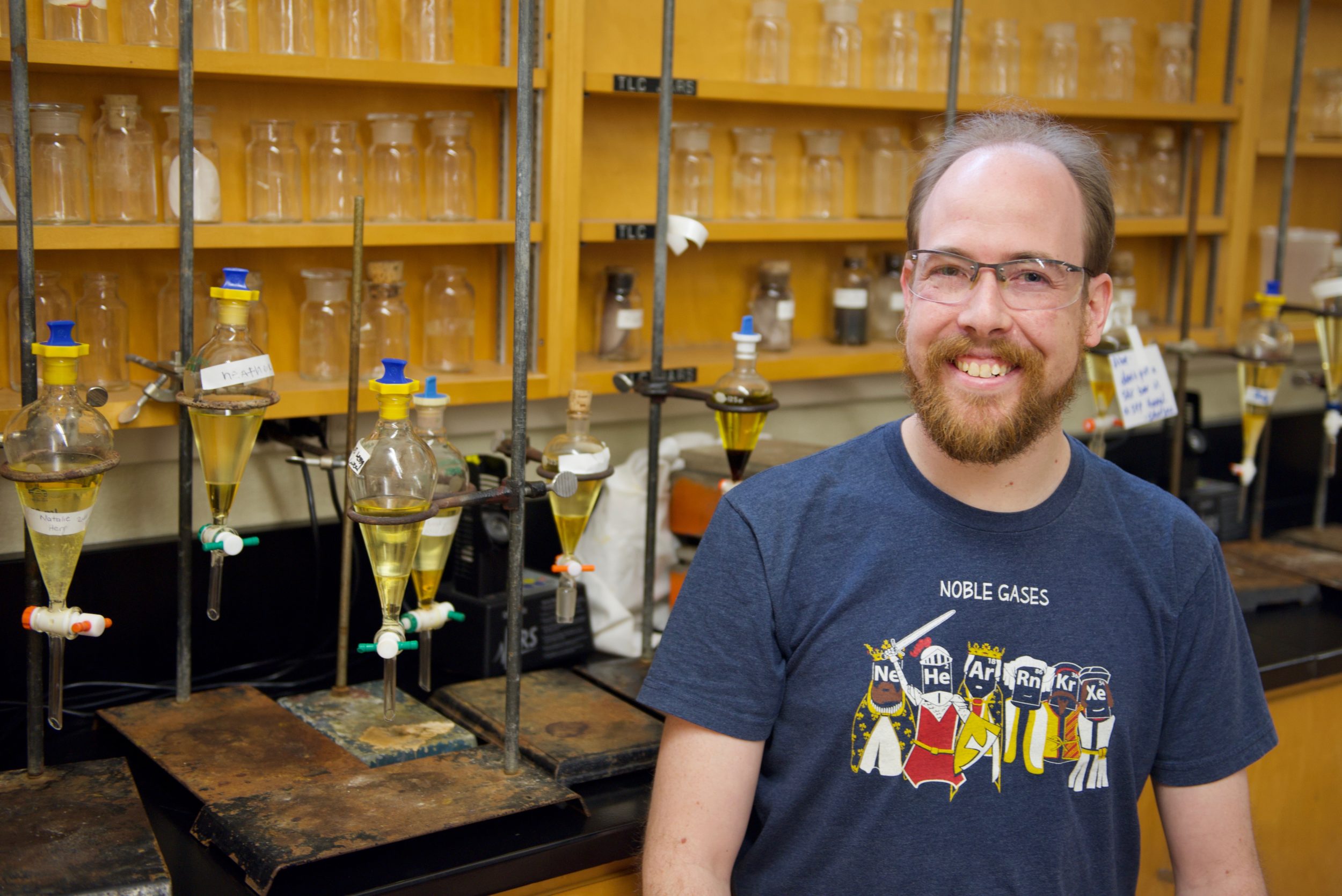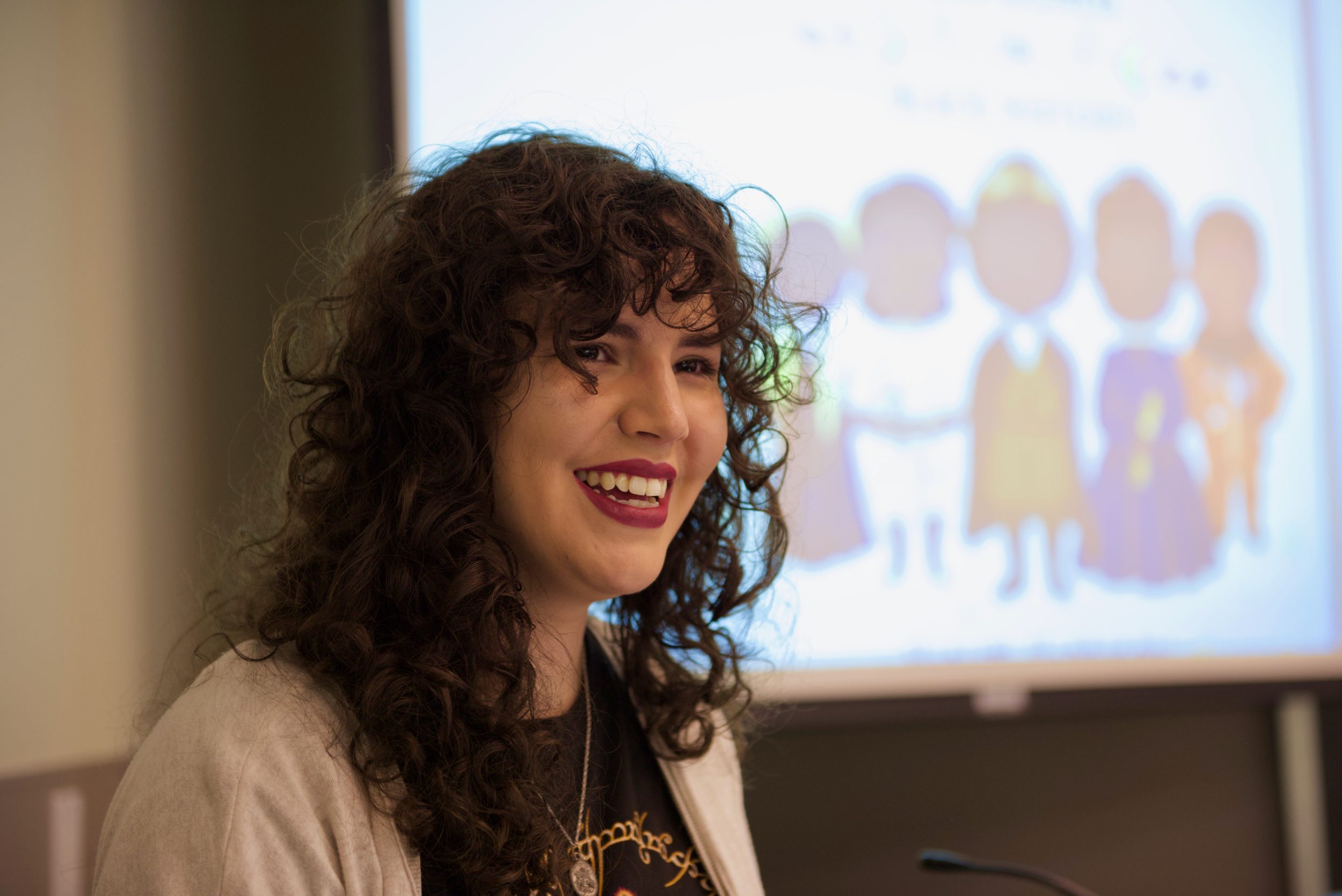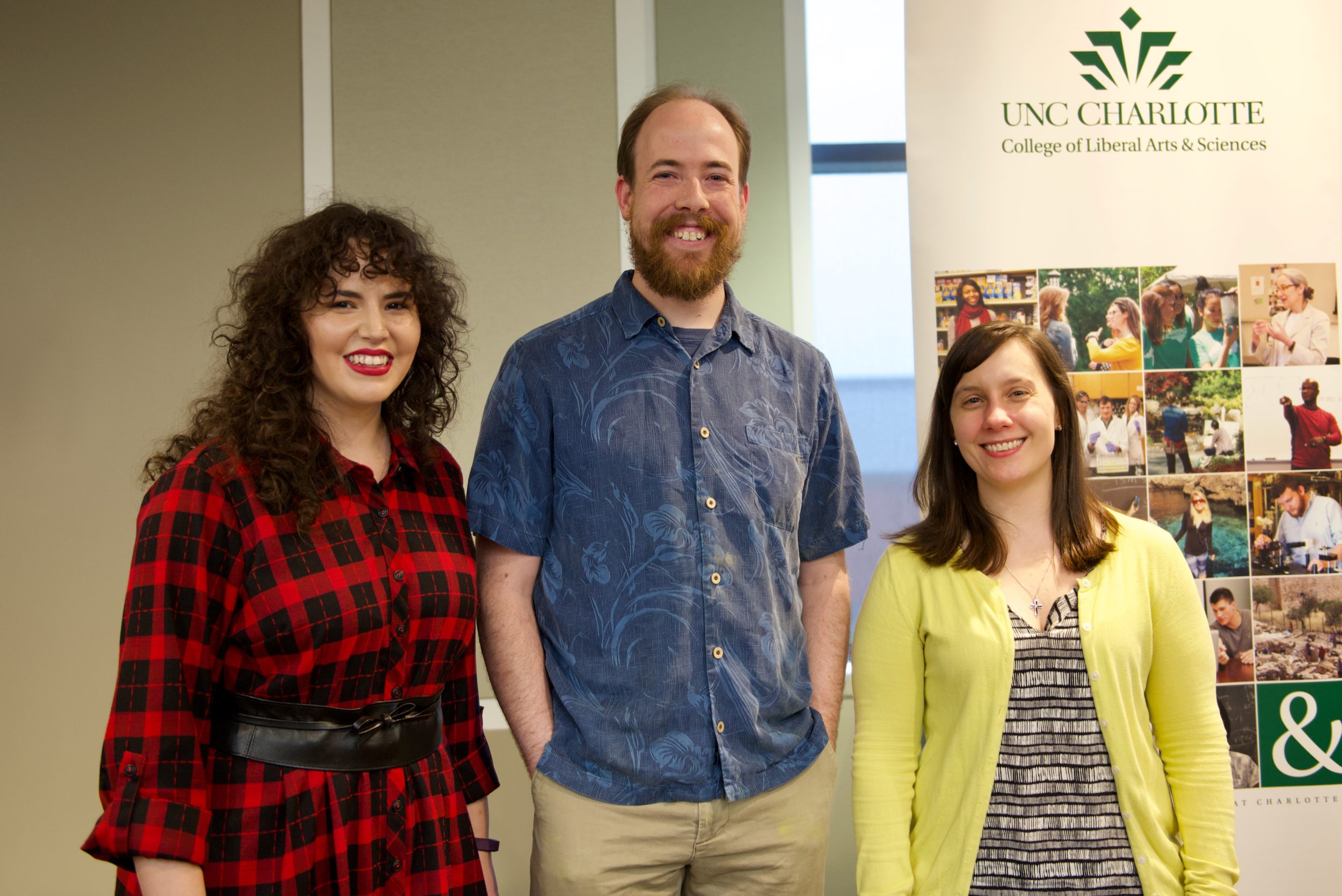A classroom approach in which students seek solutions to problems rooted in real meteorological data; non-traditional teaching techniques to help students grasp organic chemistry; and a focus on students choosing research projects geared to their interests are just some of the innovative, hands-on approaches this year’s CLAS Excellence in Teaching Awards recipients use to challenge students.
In recognition of their exceptional teaching, Casey Davenport, Jacob Horger and Valerie Bright have received the College of Liberal Arts & Sciences’ Excellence in Teaching Awards for this academic year.
Davenport, an assistant professor in the Department of Geography and Earth Sciences, has received the Integration of Undergraduate Teaching and Research Award. Horger, a lecturer and organic lab coordinator in the Chemistry Department, has received the Award for Outstanding Teaching by a Full-Time Lecturer. Bright, an adjunct faculty member in the Department of English, has received the Award for Outstanding Teaching by a Part-Time Faculty Member. They received their awards at a college celebration on Monday, April 23 in the Halton Reading Room in Atkins Library.
Integration of Undergraduate Teaching and Research Award
Casey Davenport is described by Geography and Earth Sciences Department Chair Craig Allan as a talented educator and a rising scholar in the fields of Severe Weather Meteorology and Science Pedagogy. Her scholarship is evidenced by seven articles published or in press in top-tier journals. She also has an upcoming publication in the Journal of College Science Teaching, a peer-reviewed journal published by the National Science Teachers Association.

Casey Davenport (right) tracks the path of a weather balloon.
Students play a significant role in Davenport’s research program productivity, with seven of her 18 conference presentations featuring the work of student researchers. She uses innovative teaching approaches in a series of intensive and highly quantitative undergraduate courses that center on what is called a flipped classroom approach, where students work together to explore solutions to problems rooted in real meteorological data.
A UNC Charlotte graduate praised her for being challenging and for promoting critical thinking skills. Her approaches have resulted in her receipt of a Scholarship of Teaching and Learning grant, through which she uses a pedagogy known as worked examples to impact student learning in the atmospheric dynamics courses. The award committee was particularly impressed by the fact that this success in integrating teaching and research has been achieved within her first four years at UNC Charlotte.
Finalists for the Integration of Undergraduate Teaching and Research Award were Heather Perry, an associate professor in the Department of History and Shan Yan, an associate professor in the Department of Biological Sciences.
Perry is a highly innovative instructor in the classroom who has developed new pedagogical approaches to engage undergraduate students in the study of history. These novel approaches include the History Avatar Project, in which students impersonate historical or fictional actors to acquaint themselves with lived history, as well as the use of primary sources in many of her classes.
Biological Sciences Department Chair Pinku Mukherjee and colleagues have described Yan as an effective teacher for undergraduate students in the classroom and an attentive and dedicated mentor. This is evidenced in part by student authorship of research articles in prestigious peer reviewed scientific journals and their performance in university undergraduate research fairs.
Award for Outstanding Teaching by a Full-Time Lecturer
Jacob Horger has been a lecturer and the organic lab coordinator in the Chemistry Department at UNC Charlotte since fall 2010. He received his doctorate in chemistry from the University of South Carolina in 2010. While a doctoral student, he was a three-time winner of the Joseph Bouknight Teaching Award.

Jacob Horger frequently works in the labs with students.
At UNC Charlotte, Horger teaches a number of organic chemistry courses and labs. In these, he uses a variety of different pedagogical strategies to reach his students. These include active learning activities, in-class problem solving, specification grading, and collaborative laboratory projects.
The efficacy of his unorthodox pedagogy was a common theme in his many award nominations by his students. “I have never had a teacher so passionate and dedicated to making sure their students succeed,” one student wrote. “Organic is such a difficult topic but I feel Dr. Horger he makes it much easier to (comprehend). He utilizes different methods in class to be sure we understand the topics.”
The awards committee was impressed by Horger’s willingness to continually revamp his courses for his students’ benefit, by his deployment of non-traditional approaches in the classroom, and by his genuine concern that students master skills necessary to continue their studies.
Finalists for the Award for Outstanding Teaching by a Full-Time Lecturer were Peta Ann Katz, a full-time lecturer in the Anthropology Department, and John Russell Taylor, a full-time lecturer in the Department of Mathematics and Statistics.
In her courses, Katz offers a mixture of tried-and true and cutting-edge scholarship. She encourages her students to actively engage with assigned material, pushing them to generate their own questions and write on topics of their own choosing. She also is committed to opening her students up to new perspectives and new global realities, centering her teaching in a real-world, student-centric approach.
Taylor works hard in all of his classes to create a productive learning environment. He begins by trying to gauge which learning style and pace will work best for each particular group of students or individual student. He also encourages students to engage actively in their own learning and makes himself available outside of class as much as possible.
Award for Outstanding Teaching by a Part-Time Faculty Member
Valerie Bright is an adjunct faculty member in the Department of English, teaching in the department since 2012. English Department Chair Mark West has called Bright one of the department’s strongest undergraduate teachers.

Valerie Bright teaches a children’s literature class.
Students frequently comment on her high energy, her enthusiasm for the course material, and her creativity in the classroom. The awards committee was particularly impressed by Bright’s focus on critical and imaginative thinking and her attention to small details. Impressive too is the way she structures her classes, so that students can be self-directed learners. Students can choose their own research subjects, encouraging them to be more personally involved with their work.
A major goal is to help students improve their active listening and develop critical thinking skills. Bright said she wants her students to leave the classroom with more information about the subject matter, and she also wants them to show overall growth as individuals. She particularly wants them to appreciate diversity and gain confidence.
Bright regularly has taught two of the core liberal studies courses the department offers for the general education program as well as core courses in the area of children’s literature, Literature for Young Children and Adolescent Literature. In 2012, she received her master’s degree in English at UNC Charlotte, and in 2016, she completed her Master of Library and Information Sciences at UNC Greensboro.
Finalists for the Award for Outstanding Teaching by a Part-Time Faculty Member are David Clausen, an adjunct lecturer in the Department of Religious Studies and Felecia Harris, an adjunct lecturer in the Department of Africana Studies and the Women’s and Gender Studies Program.
In the classroom, Clausen approaches the material that he teaches as both an instructor and a student. As he writes in his teaching statement, “For me, teaching begins with the acknowledgement that I am, and always will be, a student. In this, my students seem to recognize that they are being guided by a kindred spirit, a fellow seeker who continues to ask the same questions they bring with them to class.”
About her teaching, Harris writes, “all students are unique and have something special that they can bring to their own education. I will assist my students to express themselves and accept themselves for who they are, as well embrace the differences of others.” Students routinely identify her as the one person at UNC Charlotte who made the most significant, positive contribution to their education on senior exit surveys.
Images: Lynn Roberson | Top Image: Valerie Bright (from left), Jacob Horger, Casey Davenport at the awards ceremony.








